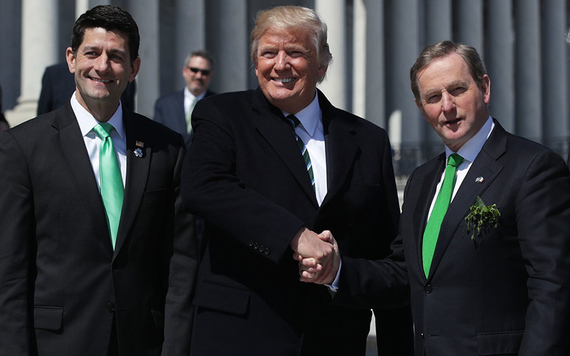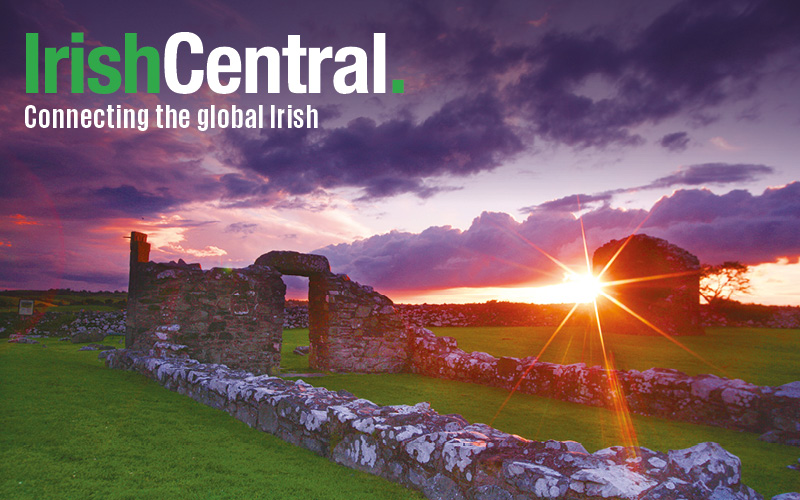Fifty-five years after his death, sound engineers have recreated President John F. Kennedy's voice to deliver the speech he was meant to give on November 22, 1963, the day he was assassinated.
The recreation, which was commissioned by The Times and Irish creative agency Rothco, is part of the JFK Unsilenced campaign, celebrating President Kennedy's legacy. Sound engineers from Scottish company CereProc used voice synthesis technology to recreate the late president's voice. The recording was published on The Times website.
The IrishCentral article below on JFK's "last speech" was originally published in June 2017.
On November 22, 1963, President John F. Kennedy was to deliver a luncheon speech to the Dallas Citizens Council. As we all know, the speech was never given as the president was struck down by an assassin’s bullet just minutes before his scheduled arrival.
But what is amazing about that speech is that JFK had a vision—maybe a premonition—about the toxic future of America.
55 years after he was killed, JFK gives his final speech https://t.co/zjKYu2rKaT pic.twitter.com/9k4TFVE00z
— The Times of London (@thetimes) March 16, 2018
Remember, that the day the President landed in Dallas—at Love Field, of all places—there were ads in the local papers, placed by right-wing extremists, draped like funeral announcements, “welcoming” the President of the United States to Texas. This is hardly surprising because, after all, UN Ambassador, and former presidential candidate, Adlai Stevenson was physically assaulted in Dallas only weeks before. In retrospect, what we were actually witnessing at the time was the birth of the Alt-Right movement in American politics.
And looking back at Kennedy’s undelivered speech it seems that the president, eerily, looked ahead more than half-a-century to the time of Trump.
JFK: There are no simple solutions

John F. Kennedy turning to his brother Robert.
One of the trademarks of Trump is how “easy” it will be to change things. Obamacare overhaul would be simple—until it wasn’t: “Nobody knew healthcare could be so complicated,” proclaimed a stunned Trump. Tax cuts, too, would be simple. The budget would be simple. Thus far, with total Republican control of the government, Trump’s “easy” agenda is on life-support. Perhaps he should have listened to Kennedy, a man who knew the complexities of a complex world.
Kennedy knew there were no “simple” solutions. “This Nation’s strength and security are not easily or cheaply obtained,” said Kennedy’s speech, “nor are they quickly and simply explained. There are many kinds of strength and no one kind will suffice.”
Foreign policy: JFK warns about confusing “rhetoric with reality”

Paul Ryan and Donald Trump with Irish Taoiseach Enda Kenny.
Trump and his surrogates—especially the “SNL”-maligned press secretary Sean Spicer—are currently bragging about the success of his trip to the Middle East and Europe. This bragging sounds a lot more like whistling past the graveyard. In Saudi Arabia, one of the most oppressive regimes in the world, there was not a peep out of Trump about human rights. After leaving the Middle East—so he thought—and arriving in Israel, he admitted, standing next to the Israeli Prime Minister, that he had told the Russians secrets that had been supplied to the U.S. by Israeli intelligence. A great start to the greatest foreign trip in the history of the U.S. presidency.
His Chevy Chase-inspired “The President’s National Lampoon’s Vacation” continued on European soil where he arm-wrestled with the French President, insulted the Germans, and generally played the stereotype of the boorish American tourist by pushing the new prime minister of Montenegro out of the way so he could get his mug in the center of a photo-op.
Read More: How JFK's love for open-top convertible cars led to his assassination
Trump’s foreign policy is defined by its chaos. Here’s what JFK’s speech was to say that day about foreign policy in a dangerous world:
“Ignorance and misinformation can handicap the progress of a city or a company, but they can, if allowed to prevail in foreign policy, handicap this country’s security. In a world of complex and continuing problems, in a world full of frustrations and irritations, America’s leadership must be guided by the lights of learning and reason – or else those who confuse rhetoric with reality and the plausible with the possible will gain the popular ascendancy with their seemingly swift and simple solutions to every world problem.”
Read more: President Donald Trump would have turned away the Famine Irish too
JFK: “Voices are heard in the land…preaching doctrines wholly unrelated to reality”

Senator JFK signs a copy of "Profiles in Courage"
Daniel Patrick Moynihan once famously said, “You are entitled to your own opinion, but you are not entitled to your own facts.”
Trump, with his “alternative facts” mentality, is trying to make Moynihan’s tenet, as Ron Ziegler, Nixon’s embattled press secretary, used to say, “inoperative.”
“There will always be dissident voices heard in the land,” Kennedy’s speech read, “expressing opposition without alternative, finding fault but never favor, perceiving gloom on every side and seeking influence without responsibility. Those voices are inevitable.
“But today other voices are heard in the land – voices preaching doctrines wholly unrelated to reality, wholly unsuited to the sixties, doctrines which apparently assume that words will suffice without weapons, that vituperation is as good as victory and that peace is a sign of weakness.
“I want to discuss with you today the status of our security because this question clearly calls for the most responsible qualities of leadership and the most enlightened products of scholarship. For this Nation’s strength and security are not easily or cheaply obtained, nor are they quickly and simply explained. There are many kinds of strength and no one kind will suffice…
Trump, thankfully, flip-flops on NATO
During the campaign, Trump famously claimed that NATO was “obsolete.” Faced with reality, he quickly changed his tune, proclaiming NATO “not obsolete.” This is the kind of flip-flop the world welcomes.
However, on his European tour, he failed to mention “Article Five,” the NATO clause that says that an attack on one NATO member is an attack on all NATO members. In fact, the only time Article Five was ever invoked was after 9/11 when NATO came to the aid of the U.S. Instead, Trump went on a tirade about NATO members not paying their dues. The Russians are smiling. Here’s what a real president had to say about America’s key European alliances:
“Our security and strength,” Kennedy declared in this last, undelivered speech, “in the last analysis, directly depend on the security and strength of others, and that is why our military and economic assistance plays such a key role in enabling those who live on the periphery of the Communist world to maintain their independence of choice. Our assistance to these nations can be painful, risky, and costly, as is true in Southeast Asia today. But we dare not weary of the task. The success of our leadership is dependent upon respect for our mission in the world as well as our missiles – on a clearer recognition of the virtues of freedom as well as the evils of tyranny.”
Read more: Trump and JFK are very similar in many ways
JFK’s reminder to Trump—We are “watchmen”

“Finally,” Kennedy’s speech reads, “it should be clear by now that a nation can be no stronger abroad than she is at home. Only an America which practices what it preaches about equal rights and social justice will be respected by those whose choice affects our future. Only an America which has fully educated its citizens is fully capable of tackling the complex problems and perceiving the hidden dangers of the world in which we live. And only an America which is growing and prospering economically can sustain the worldwide defenses of freedom while demonstrating to all concerned the opportunities of our system and society.
“We, in this country, in this generation, are – by destiny rather than by choice – the watchmen on the walls of world freedom. We ask, therefore, that we may be worthy of our power and responsibility, that we may exercise our strength with wisdom and restraint, and that we may achieve in our time and for all time the ancient vision of “peace on earth, goodwill toward men.” That must always be our goal, and the righteousness of our cause must always underlie our strength. For as was written long ago: ‘except the Lord keep the city, the watchmen waketh but in vain.’ ”
Kennedy, a 21st-century President vs. Donald Trump, Tweeter

President John F. Kennedy points to a reporter during a press conference. State Department Auditorium, Washington, D.C. CREDIT: ABBIE ROWE. WHITE HOUSE PHOTOGRAPHS. JOHN F. KENNEDY PRESIDENTIAL LIBRARY AND MUSEUM, BOSTON
This undelivered speech draws a stunning contrast between the 35th and 45th presidents of the United States. It is truly amazing to see how a man born in 1917—and dead for 54 years—seems, through this speech and his whole portfolio of work, to have a firmer grip on the complexities of the 21st century than the present President of the United States.
A comparison of the two men has only two things in common—they were both born millionaires and they both liked girls.
Other than that, you have one man, Kennedy, a graduate of Harvard, with a rich understanding of politics and culture, a Pulitzer Prize-winner for “Profiles in Courage.” And another man, a product of Queens, New York, and its sleazy real estate market, with an interest only in money—and himself.
Read More: Joe Kennedy on what JFK would think of Donald Trump and the family legacy
Kennedy had a deep intellectual curiosity about the world. His inauguration speech is considered one of the best in the history of the Republic. He had Robert Frost recite poetry at his inauguration. He had Pablo Casals perform at the White House. He is the man who said, “If more politicians knew poetry, and more poets knew politics, I am convinced the world would be a little better place in which to live.”
Trump’s inauguration? He was counting the size of his crowd.
One suspects that if you ever said to Trump, “Have you ever read Yeats?”
His response would be, “I fired her!”
We live in a very dangerous world. Unfortunately, the man who should be leading the United States in this perilous time is dead. It appears that we shall live—and die—by the Tweet.
Dermot McEvoy is the author of "The 13th Apostle: A Novel of Michael Collins and the Irish Uprising" and "Our Lady of Greenwich Village," both now available in paperback, Kindle and Audio from Skyhorse Publishing. He may be reached at [email protected]. Follow him at www.dermotmcevoy.com. Follow The 13th Apostle on Facebook at www.facebook.com/13thApostleMcEvoy.
* Originally published in 2017.




Comments